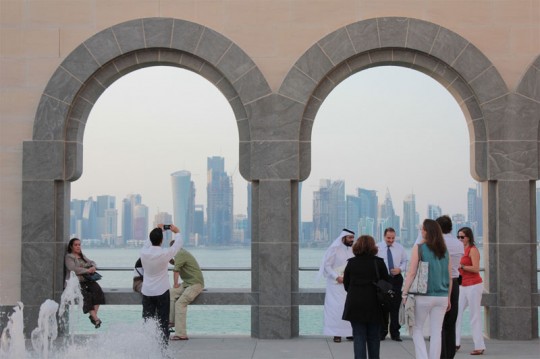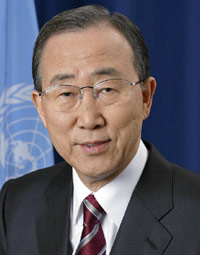Ban urges Alliance of Civilizations to fight extremism, promote tolerance
Ban urges Alliance of Civilizations to fight extremism, promote tolerance
 Museum of Islamic Arts, Doha
Museum of Islamic Arts, Doha
Secretary-General Ban Ki-moon urged members of the Alliance of Civilizations today to combat extremism and promote tolerance at a time when universal values are being tested in many parts of the world, particularly in countries undergoing political transitions.“Again and again, we are reminded that our differences are nothing compared to our shared humanity,” Mr. Ban said in his remarks to the opening session of the fourth United Nations Alliance of Civilizations Forum in Doha, Qatar.More than 2,000 participants, including political and corporate leaders, civil society activists and faith communities have gathered there to take part in the UN Alliance of Civilizations Forum (UNAOC) to discuss how to improve relations across cultures, combat prejudice and build lasting peace.
The Alliance has a special role in speaking out when terrorists attack and kill innocent people, when politicians stir hatred and exploit stereotypes to win votes, when moderate voices struggle to be heard amid the politics of polarization.
“Speaking out against extremism, advancing tolerance, standing for justice, dignity and mutual understanding. These values are at the core of the Alliance of Civilizations,” Mr. Ban said, noting that these principles were more important than ever during times of change.
“Everywhere, these values are being tested. We see in the daily news headlines: in Syria, North Africa, across the Middle East, and beyond.”
Mr. Ban stressed the Alliance’s responsibility to prevent conflict and violence by promoting dialogue and laying the groundwork for mutual understanding.
“The Alliance has a special role in speaking out when terrorists attack and kill innocent people, when politicians stir hatred and exploit stereotypes to win votes, when moderate voices struggle to be heard amid the politics of polarization,” he said.
The Secretary-General underscored the need to help nations in transition in the Middle East and North Africa who have been part of the so-called Arab Spring movement.
“In some countries these transitions have been peaceful. Others have seen bloody crackdowns. But in all, reconciliation is essential for transformations to succeed,” he said. “There is considerable scope for the Alliance to help these nations to shape their future.”
Mr. Ban told members of the Alliance that empowering women and youth, along with achieving sustainable development, should also be key areas of focus to ensure a positive future.
“I want the coming years to see an emphasis on the problems of women and children, in particular – in health, in education, in creating jobs and new opportunities on a scale never seen before,” he said.
He also warned against potential new divides that impact development, and called on the Alliance to do its utmost to engage with students, families, activists and their religious communities.
“Have a dialogue – far and wide. But also ensure that it leads to action – real and concrete to make this world better for all people.”
President of the General Assembly Nassir Abdulaziz Al-Nasser also spoke at the forum, praising the Alliance for emphasizing “the good governance of cultural diversity as an important strategy for peace” since its inception.
He stressed that as the deadline for the Millennium Development Goals (MDGs) approaches, the work of the Alliance will become even more relevant as the world starts to build “a post-MDGs agenda,” and added the Doha forum should be a turning point for the Alliance.
“By emphasizing the crucial connection between cultural diversity, peace and development, the forum will advance the Alliance’s visibility and highlight its relevance to the global agenda.”
Mr. Al-Nasser also said he was encouraged to see a strong focus on the contribution of youth to the forum. “I am a firm believer in the need for youth participation in efforts to advance cross-cultural understanding and sustainable development,” he said.
He also shared his plans to organize an interactive debate of the General Assembly on the topic of the Alliance in March to foster intercultural dialogue and spotlight successful initiatives by young people exploring innovative means to collaborate among cultures.
During his visit to Doha, Mr. Ban also inaugurated an anti-corruption centre to promote transparency.
“When desperately needed funds fail to reach their destinations, it is the poor and vulnerable people who are denied education, healthcare and other essential services to maintain a dignified [life],” Mr. Ban said at the centre’s opening ceremony.
“At a time when many millions of people are suffering grievously from the economic crisis and rising prices for food and fuel, the fight against corruption takes on even more urgency than it had already,” he added.
“Fighting corruption is a job for all of us, from CEOs in boardrooms to police on the streets, from civil servants in their ministries to prosecutors and judges in their courtrooms,” Mr. Ban stressed. “We all have a responsibility to speak up in the face of corruption. Integrity starts with individuals.”
###
…
Alliance of Civilizations, UN forum seeks to boost dialogue, tolerance to curb extremism
Secretary-General Ban Ki-moon urged members of the Alliance of Civilizations today to combat extremism and promote tolerance at a time when universal values are being tested in many parts of the world, particularly in countries undergoing political transitions.
“Again and again, we are reminded that our differences are nothing compared to our shared humanity,” Mr. Ban said in his remarks to the opening session of the fourth United Nations Alliance of Civilizations Forum in Doha, Qatar.
…
Added on Dec 12, 2011
###

Ban Ki-moon
Secretary-General of the United Nations.
Ban Ki-moon is the eighth Secretary-General of the United Nations. His priorities have been to mobilize world leaders around a set of new global challenges, from climate change and economic upheaval to pandemics and increasing pressures involving food, energy and water. He has sought to be a bridge-builder, to give voice to the world’s poorest and most vulnerable people, and to strengthen the Organization itself.“I grew up in war”, the Secretary-General has said, “and saw the United Nations help my country to recover and rebuild. That experience was a big part of what led me to pursue a career in public service. As Secretary-General, I am determined to see this Organization deliver tangible, meaningful results that advance peace, development and human rights.”Mr. Ban took office on 1 January 2007. Highlights of his tenure have included:
Promoting sustainable development
One of the Secretary-General’s first major initiatives was the 2007 Climate Change Summit, followed by extensive diplomatic efforts that have helped put the issue at the forefront of the global agenda. Subsequent efforts to focus on the world’s main anti-poverty targets, the Millennium Development Goals, have generated more than $60 billion in pledges, with a special emphasis on Africa and the new Global Strategy on Women’s and Children’s Health. At the height of the food, energy and economic crises in 2008, the Secretary-General successfully appealed to the G20 for a $1 trillion financing package for developing countries and took other steps to guide the international response and protect the vulnerable and poor.
Empowering women
The Secretary-General pressed successfully for the creation of UN Women, a major new agency that consolidates the UN’s work in this area. His advocacy for women’s rights and gender equality has also included the “Unite to End Violence against Women” campaign, the “Stop Rape Now” initiative, the creation of a “Network of Men Leaders” and the establishment of a new Special Representative on Sexual Violence in Conflict. Within the UN itself, the Secretary-General has increased the number of women in senior management positions by more than 40 per cent, reaching the highest level in the Organization’s history.
Supporting countries facing crisis or instability
The Secretary-General has sought to strengthen UN peace efforts, including through the New Horizons peacekeeping initiative, the Global Field Support Strategy and the Civilian Capacity Review, a package of steps to improve the impact of the 120,000 United Nations “blue helmets” operating in the world’s conflict zones. A mediation support unit, along with new capacity to carry out the Secretary-General’s good offices, have been set up to help prevent, manage and resolve tensions, conflicts and crises. Accountability for violations of human rights has received high-level attention through inquiries related to Gaza, Guinea, Pakistan and Sri Lanka, legal processes in Lebanon and Cambodia, and advocacy for the “responsibility to protect,” the new United Nations norm aimed at prevent and halt genocide and other grave crimes. He has also sought to strengthen humanitarian response in the aftermath of mega-disasters in Myanmar (2008), Haiti (2010) and Pakistan (2010), and mobilized UN support for the democratic transitions in North Africa and the Middle East.
Generating new momentum on disarmament, arms control and non-proliferation
The Secretary-General has sought to rejuvenate the disarmament agenda through a five-point plan, efforts to break the deadlock at the Conference on Disarmament and renewed attention to nuclear safety and security in the aftermath of the tragedy at the Fukushima Daiichi Nuclear Power Plant.
Strengthening the UN
The Secretary-Generalhas introduced new measures aimed at making the United Nations more transparent, effective and efficient. These include heightened financial disclosure requirements, compacts with senior managers, harmonization of business practices and conditions of service, the adoption of International Public Sector Accounting Standards, and continued investments in information technology and staff development.
Personal
The Secretary-General was born in the Republic of Korea on 13 June 1944. He received a bachelor’s degree in international relations from Seoul National University in 1970. In 1985, he earned a master’s degree in public administration from the Kennedy School of Government at Harvard University.At the time of his election as Secretary-General, Mr. Ban was his country’s Minister of Foreign Affairs and Trade. His 37 years of service with the Ministry included postings in New Delhi, Washington D.C. and Vienna, and responsibility for a variety of portfolios, including Foreign Policy Adviser to the President, Chief National Security Adviser to the President, Deputy Minister for Policy Planning and Director-General of American Affairs.Mr. Ban’s ties to the United Nations date back to 1975, when he worked for the Foreign Ministry’s United Nations Division. That work expanded over the years, with assignments that included service as Chairman of the Preparatory Commission for the Comprehensive Nuclear Test Ban Treaty Organization and Chef de Cabinet during the Republic of Korea’s 2001-2002 presidency of the UN General Assembly. Mr. Ban has also been actively involved in issues relating to inter-Korean relations.The Secretary-General speaks English, French and Korean. He and his wife, Madam Yoo (Ban) Soon-taek, whom he met in high school in 1962, have one son, two daughters and three grandchildren. Since 2007, Mrs. Ban has devoted her attention to women’s and children’s health, including autism, the elimination of violence against women, and the campaign to prevent mother-to-child transmission of HIV/AIDS.
###
> United Nations (UN).
 The United Nations was established on 24 October 1945 by 51 countries committed to preserving peace through international cooperation and collective security. Today, nearly every nation in the world belongs to the UN: membership totals 192 countries.
The United Nations was established on 24 October 1945 by 51 countries committed to preserving peace through international cooperation and collective security. Today, nearly every nation in the world belongs to the UN: membership totals 192 countries.
When States become Members of the United Nations, they agree to accept the obligations of the UN Charter, an international treaty that sets out basic principles of international relations. According to the Charter, the UN has four purposes:
- to maintain international peace and security;
- to develop friendly relations among nations;
- to cooperate in solving international problems and in promoting respect for human rights;
- and to be a centre for harmonizing the actions of nations.
###
* The above story is adapted from materials provided by United Nations (UN)
** More information at United Nations (UN)




















